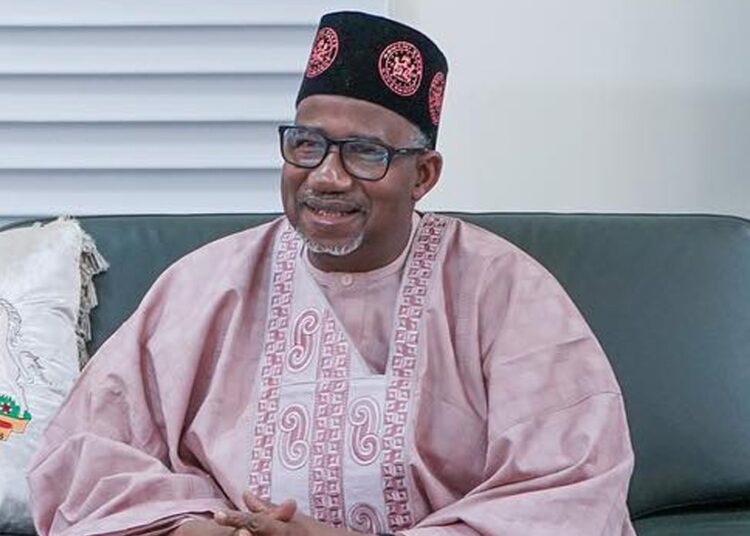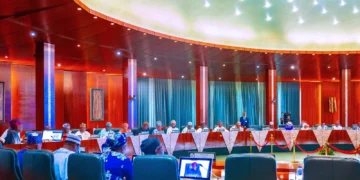The ongoing war of words between Bauchi State Governor Bala Mohammed and Foreign Affairs Minister Yusuf Tuggar leaves a bitter taste in my mouth. Not because of the natural political rivalry between two prominent sons of Bauchi, but because of what it reveals about our political culture.
Let’s begin with what triggered this political storm. During a BBC Hausa interview, Governor Mohammed expressed concerns about Nigeria’s diplomatic handling of regional issues and criticised certain aspects of President Bola Tinubu’s tax reform bills. The Foreign Affairs Minister, Ambassador Tuggar, responded with his own observations about governance in their home state.
What makes this exchange particularly intriguing is the backdrop against which it’s happening. Both men are accomplished politicians with significant track records.
Governor Mohammed, a former senator and minister, has been at the helm of Bauchi’s affairs since 2019. Ambassador Tuggar, on the other hand, brings substantial diplomatic experience to the table, having served as Nigeria’s Ambassador to Germany from 2017 to 2023 before his current role as Foreign Affairs Minister.
The interesting aspect of their disagreement isn’t just about personality or politics – it’s about different visions of governance and development. When you peel back the layers of their public statements, you find fundamental questions about priorities in governance and the relationship between states and the federal government.
Take, for instance, the debate about the state’s development projects. The construction of a new Government House has become a point of contention, with questions raised about project variations and priorities. While infrastructure development is crucial, the debate really centers on priority setting in a state facing significant developmental challenges.
What’s particularly noteworthy is how this local issue has become intertwined with national politics. Governor Mohammed’s criticism of the federal government’s tax reform bills and foreign policy approaches has added another dimension to what might have remained a state-level discussion.
This brings us to an important point about Nigeria’s federal structure. How do states balance their autonomy with federal alignment? When should governors speak up about national policies, and how should such criticism be framed? These are questions that go beyond Bauchi and touch on our broader democratic experience.
The National Bureau of Statistics (NBS) presents some sobering data about development challenges in Bauchi State. These statistics suggest that Bauchi faces significant developmental hurdles.
What’s particularly interesting is the potential for cooperation that exists beneath the surface of this political disagreement. Before their current differences, there was actually a productive relationship between these politicians. Ambassador Tuggar, during his tenure in Germany, facilitated several memoranda of understanding between German companies and Bauchi State. This included arrangements that brought tangible benefits to the state, including support for persons with disabilities.
What particularly strikes me as bizarre is the governor’s attempt to blame Tuggar for military coups that happened before the current administration took office. How does one blame the Foreign Affairs Minister for coups in Mali, Burkina Faso, and Niger Republic that occurred before he assumed office?
This historical cooperation raises an important question: How can states better leverage federal connections for development, regardless of political differences? The fact that Bauchi now has a senior federal minister should theoretically position it for increased federal collaboration and support.
The timing of this political tension is also noteworthy. With 2027 still three years away, the early emergence of political positioning raises questions about its impact on governance. While political competition is healthy in a democracy, the challenge is ensuring it doesn’t overshadow the immediate tasks of governance.
Looking at the bigger picture, this situation reflects a common challenge in Nigerian politics – the difficulty of separating governance from political competition. When does healthy political discourse cross the line into distraction from governance? How can political leaders maintain their opposing positions while still collaborating for the greater good of their constituents?
The federal allocations to Bauchi State – N144 billion in 2023 – represent significant resources that could drive development. The critical question isn’t just about the size of these allocations but how effectively they’re utilised for development. This is a challenge facing not just Bauchi but many states across Nigeria.
Another aspect worth examining is the role of regional politics in national discourse. While regional perspectives are important, they shouldn’t overshadow the fundamental issues of development and good governance.
The needs of the common citizen – healthcare, education, economic opportunities – transcend regional considerations.
Looking forward, there are several potential paths for resolution. First, both the state and federal governments could focus on areas of mutual benefit, setting aside political differences for developmental goals. Second, there could be a more structured approach to state-federal dialogue, particularly on issues affecting state development.
The media also has a crucial role to play.
Rather than amplifying political tensions, coverage could focus more on substantive issues of governance and development. This would help shift the discourse from personality-based politics to policy-based discussions.
For the people of Bauchi, the ideal scenario would be one where political differences don’t impede development. A situation where state and federal officials, regardless of their political futures, work together to address the state’s challenges.
The solution might lie in creating institutional frameworks that ensure cooperation between state and federal governments continues regardless of personal or political differences. This could include formal mechanisms for regular consultation and collaboration on development projects.
As we move closer to 2027, it’s crucial that political positioning doesn’t overshadow the immediate needs of governance. The real measure of success for any administration – whether state or federal – should be its impact on the lives of ordinary citizens.
Consequently, while the political drama between Governor Mohammed and Minister Tuggar makes for interesting headlines, the focus should remain on how their positions can be leveraged for Bauchi’s development. The state’s future depends not on political rhetoric but on concrete actions that improve the lives of its citizens.
The lesson here isn’t about who’s right or wrong in this political exchange, but rather about how political leaders can disagree while still working together for the greater good. That’s the kind of political maturity Nigeria needs as it continues its democratic journey.





